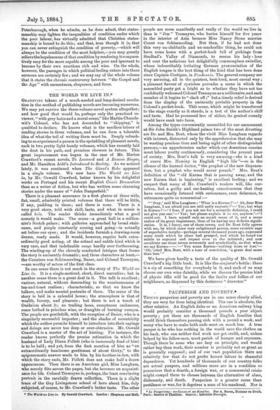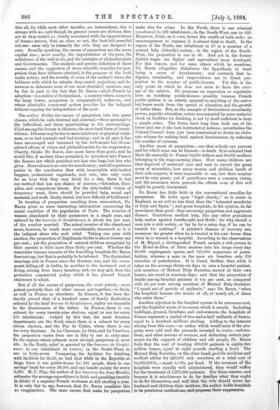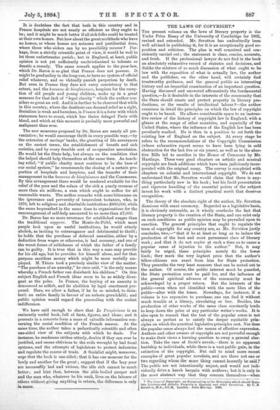PAUPERISM AND POVERTY.*
THCRIGH pauperism and poverty are in one sense closely allied, they are very far from being identical. The one is absolute, the other relative. An English duke or an American railway king would probably consider a thousand pounds a year abject poverty ; yet there are thousands of English families that would think themselves passing rich with a pound a week, and many who have to make both ends meet on much less. A true pauper is he who has nothing in the world save the clothes on his back, who can neither find work nor get credit, and, unless helped by his fellow-men, must perish of hunger and exposure. Though there be some who are lazy on principle, and would rather beg than work, their number is probably not so great as is generally supposed ; and of our vast population there are relatively few that do not prefer honest labour to shameful dependence. Yet hundreds of thousands of our country-folks are actual paupers, and millions more are in a condition so precarious that a dearth, a foreign war, or a commercial crisis, might compel them to choose between the alternative of alms, dishonesty, and death. Pauperism is a greater curse than pestilence or war, for it deprives a man of his manhood. Nor is * Le Paupirisme : see atusee et sae Remade,. Par A. Baron, Dootenr en Droit. Paris : Sandoz at Thuilher. Lteeive Librairie Desrogis.
this all, for while most other troubles are intermittent, this is always with us ; and though its general causes are obvious, they are so deep-seated, so closely associated with the imperfections of human nature, that, as often as not, the best-laid remedial scheme; seem only to intensify the evils they are designed to cure. Broadly speaking, the causes of pauperism are the seven capital sins ; more exactly, the improvidence of the poor, the selfishness of the well-to-do, and the mistakes of philanthropists and Governments. The analysis and precise definition of these causes, and the suggestion of more scientific remedies for pau- perism than have hitherto obtained, is the purpose of the book under notice ; and the novelty of some of the author's views, the boldness with which he attacks deep-seated prejudices, and de- nounces as delusions some of our most cherished opinions, may be due in part to the fact that Dr. Baron—albeit French by adoption—is a native of S witzerland,—a country where, except in the large towns, pauperism is comparatively unknown, and whose admirable communal system provides for the indigent without sapping the independence of the poor.
The author divides the causes of pauperism into two great classes, which he calls internal and external,—those personal to the individual, and those appertaining to his surroundings. Chief among the former is idleness, the most fatal form of impro- vidence. Idleness may be due to mere indolence, to physical weak- ness, or to bad example and bad training ; and in all ages it has been encouraged and increased by the well-meant but ill-con- sidered efforts of rulers and philanthropists for its suppression. Charity, thinks Dr. Baron, does more harm than good ; and he would like, if modern ideas permitted, to introduce into France the Roman law which punished not him who begs, but him who gives. Benevolence is no cure for mendicancy ; and all experience points to the conclusion that with incorrigible able-bodied beggars, professional vagabonds, and sots, who only work for an hour that they may drink for a day, there is but one method that has any chance of success,—detention, disci- pline, and compulsory labour. For the able-bodied victim of temporary want, there should be provided help, moral and material, and work. Easily stated, but how difficult of fulfilment !
In treating of pauperism resulting from misconduct, Dr. Baron gives us some interesting information concerning the moral condition of the population of Paris. The number of women abandoned by their paramours in a single year, and relieved by the bureaux de bienfaisanee, is about ten per cent. of the number married. The actual number of the abandoned must, however, be much more considerable, inasmuch as it is the indigent alone who seek relief. Taking one year with another, the proportion of illegitimate births is about twenty-one per cent.; yet the proportion of natural children recognised by their parents is little more than thirty per cent. Whether the remainder become inmates of the foundling hospitals Dr. Baron . does not say, but that is probably to be inferred. The diminished marriage rate in France since the German war, and the conse- quent falling-off in births, he ascribes to the increased cost of living, arising from heavy taxation, and, we may add, from the protective commercial policy which it has pleased French statesmen to adopt.
But of all the causes of pauperism, the most potent,—more potent probably than all other causes put together,—is drink, as well in France as elsewhere. In Geneva, it has been dis- tinctly proved that of a hundred cases of family destitution relieved by the local bureau de bienfaisance, eighty are traceable to the drunkenness of the father. In France, there is one cabaret for every twenty-nine electors, equal to one for every 105 inhabitants. Judged by this test, the most drunken -departments are the Nord, where there is a cabaret for every -eleven electors, and the Pas de Calais, where there is one for every fourteen. In La Charente, Le Gers, and Le Vauchne, the proportion varies from one in fifty to one in sixty-nine. Ta the regions where cabarets most abound, pauperism is most rife. In the North, relief is granted by the bureaux de bienfai- ennce to one inhabitant in twelve; in the South-West, to one in forty-seven. Comparing. the facilities for drinking with facilities for thrift, we find that while in the Republic at large, there is one public-house for 105 people, there is one savings' bank for every 28,500, and one benefit society for every 5,400. M. C. Play, the author of Les- Ouvriers des deux Mendes, estimates the average expenditure in drink and gambling (mostly in drink) of a superior French workman at £28 sterling a year. It is only fair to say, however, that Dr. Baron considers this sn exaggeaation. The same causes that make for pauperism make also for crime. In the North, there is one criminal (condamne) to 269 inhabitants ; in the South-West, one to 626. Moreover, drink, as it were, burns the candle at both ends ; an encouragement to expense, it is almost fatal to thrift. In the region of the North, one inhabitant in 29 is a member of a mutual help (friendly) society ; in the region of the South- West, the proportion is one to 46. And yet in the former district wages are higher and agriculture more developed. For this reason, and for some others which he mentions, Dr. Baron altogether disbelieves the hypothesis of want being a cause of drunkenness ; and contends that in- digence, criminality, and improvidence are in direct pro- portion to the number of public-houses. Yet this is the only point on which lie does not seem to have the cour- age of his opinion. He proposes no repression or regulative laws as touching public-houses—possibly because French public opinion is so utterly opposed to anything of the sort— but hopes much from the spread of education and the growth of better ideas. But, as the example of Switzerland abundantly proves, popular education, unless accompanied by some material check on facilities for drinking, is not by itself sufficient to keep a people sober. The Swiss have long been both one of the freest and one of the best instructed of nations ; nevertheless the Federal Council have just been constrained to devise an elabo- rate scheme for making head against drunkenness, by reducing the number of cabarets.
Another cause of pauperism,—one that nobody can prevent and for which none can be blamed,—is death. It is reckoned that there die annually in France 34,000 fathers and 80,000 mothers belonging to the wage-earning :class. How many children are thus deprived of maternal care and sent to recruit the great army of miserables, how many women and children bereft of their sole support, it were impossible to say, but their number must be very great; yet if providence were a common virtue, and life-assurance more general, the effects even of this evil might be greatly diminished.
Dr. Baron has little faith in the conventional remedies for pauperism. He looks upon " legal charity," as it exists in England, as an evil no less fatal than the "tolerated mendicity of Italy and Spain "; and great hospitals, in his opinion, do far more harm than good : they encourage pauperism and aggravate disease. Gratuitous medical help, like any other gratuitous help, makes against forethought and thrift ; for why should a man join a sick society, or- lay by for a rainy day, if he can be treated for nothing? A patient's chances of recovery are, moreover, far greater when he is treated in his own house than when he is treated in a hospital. According to the observations of M. Miguel, a distinguished French savant, a sick person in the Hotel-de-Dieu of Paris receives into his lungs every day 80,000 cryptogamic spores -and 125,000 organisms of putre- faction, whereas a man in the open- air breathes only 250 microbes of putrefaction. It is found, further, that, while it takes on the average thirty-six days to cure a hospital patient, sick members of Mutual Help Societies, nursed at their own homes, are cured in nineteen days ; and that the proportion of deaths among hospital patients is ten per cent., as compared with six per cent. among members of Mutual Help Societies. "I speak not of periods of epidemic," says Dr. Baron, "when the hospitals become the tombs of all, or nearly all, of those who enter them."
Another objection to the hospital system is its enormous cost, and the frightful waste of resources which it entails. Including buildings, ground, furniture, and endowments, the hospitals of France represent a capital of two-and-a-half milliards of francs, equal to a hundred millions sterling. Adding to the interest arising from this sum,—or rather which would arise if the pro- perty were sold and the proceeds invested in rentes,—subven- flans, and other sources of revenue, and deducting certain pay- ments for the support of children and old people, Dr. Baron finds that the cost of treating 410,000 patients is eighty-five million francs, equal to eight pounds sterling a head. The Mutual Help Societies, on the other hand, provide medicine and medical advice for 220,000 sick members, at a total cost of 10,000,000 fr.,—equal to 37s. per head. If the revenues of the hospitals were equally well administered, they would suffice for the treatment of 1,870,000 patients. For these reasons, and because it is mischievous to do for families what they ought to do for themselves, and well that the wife should nurse her husband and children their mothers, the author holds hospitals to be pernicious institutions, au& proposes their suppression. It is doubtless the fact that both in this country and in France hospitals are not nearly so efficient as they ought to be ; and it might be much better if all sick folks could be treated at their own homes. Bnt how about the great multitude who have no homes, or whose homes are noisome and pestilential dens, where those who sicken can by no possibility recover P Per- haps, from a strictly scientific point of view, it would be well to let these unfortunates perish ; but in England, at least, public opinion is not yet sufficiently nnchristianised to tolerate so drastic a remedy. The same remark applies to the poor-law, which Dr. Baron is so glad that France does not possess. It might be good policy in the long-run, to have no system of official relief whatever, and so virtually punish pauperism by death. But even in France they dare not carry consistency to that extent, and the bureaux de bienfaisance, hospices for the recep- tion of old people and young children, make up in a great measure for that lack of " legal charity " which the author con- siders so great an evil. And it is further to be observed that while in this country, where the destitute can demand relief as a right, Socialism is weak and harmless, in France it is a force with which statesmen have to count, which has thrice deluged Paris, with blood, and which at this moment is probably more powerful and malignant than ever.
The new measures proposed by Dr. Baron are nearly all pre- ventative; he would encourage thrift in every possible way,—by the extension of savings' banks, the granting of life assurances on the easiest terms, the establishment of benefit and sick societies, and by every feasible sort of co-operative association. He would let the State help, but always on the condition that the helped should help themselves at the same time. As touch- ing relief, " if public charity must continue to be the base of our social system," he recommends the closing of a certain pro- portion of hospitals and hospices, and the transfer of their management to the bureaux de bienfaisance and the Communes. By this arrangement there would be rendered available for the relief of the poor and the solace of the sick a yearly revenue of more than six millions, a sum which ought to suffice for all reasonable wants. The author remarks with some bitterness on the ignorance and perversity of benevolent testators, who, in 1876, left to religions and charitable institutions £800,000, while the sums bequeathed in the same time to organisations for the encouragement of self-help amounted to no more than £7,000.
Dr. Baron has no more reverence for established usages than the traditional sappeur. The Monts-de-Pi6t6, which most people look upon as useful institutions, he would utterly abolish, as inciting to extravagance and detrimental to thrift; he holds that the purchase of deferred annuities, either by a deduction from wages or otherwise, is bad economy, and one of the worst forms of selfishness of which the father of a family can be guilty. It is true that in this way a man may provide for his old age, but he provides for himself alone, and for that purpose sacrifices money which might be more usefully em- ployed. M. Ihiers took a precisely similar view of the matter. "The purchase of an annuity," he once said, " is the only means whereby a French father can disinherit his children." On this subject English and French ideas seem to be as widely diver- gent as the poles. In France, the buying of an annuity is denounced as selfish, and its abolition by legal enactment pro- posed. Here, we allow a father, if he be so minded, to disin- herit an entire family in favour of an unborn grandchild; and public opinion would regard the proceeding with the coolest indifference.
We have said enough to show that Le Paupgrisme is an eminently useful book, full of facts, figures, and ideas ; and it presents in a concrete form a mass of valuable information con- cerning the social condition of the French masses. At the same time, the author takes a pedantically scientific and often one-sided view of the subjects with which he deals. For instance, he condemns strikes utterly, doubts if they can ever be justified, and seems oblivious to the evils wrought by bad fiscal systems, and the attempts of legislators to protect industries and regulate the course of trade. A Socialist might, moreover, urge that the book is one-sided ; that it has one measure for the lowly and another for the great ; suggest that if the lazy poor are necessafily had and vicious, the idle rich cannot be much better ; and hint that, between the able-bodied pauper and and the man who, whatever be his rank, lives on the labours of others without giving anything in return, the difference is only in name.












































 Previous page
Previous page